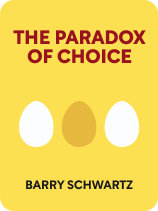

This article is an excerpt from the Shortform book guide to "The Paradox of Choice" by Barry Schwartz. Shortform has the world's best summaries and analyses of books you should be reading.
Like this article? Sign up for a free trial here .
Does committing to one relationship make you happier—or more anxious? Why do relationships require so much time commitment?
In the book The Paradox of Choice, author Barry Schwartz explores the connection between commitment and relationships. He argues that, just like in other areas of your life, you will be happier with limited choices rather than seeking the freedom to be with whomever you want, whenever you want.
Here’s an overview of Schwartz’s ideas about relationships.
Why Limiting Our Choice Can Make Us Happier
When it comes to commitment and relationships, Schwartz acknowledges the importance of choice yet advocates voluntarily limiting our choices in order to avoid being overwhelmed. Above all, he recommends limiting choice by prioritizing relationships. When we choose to invest in close relationships, we limit our options and assume responsibility for others, yet Schwartz argues that limiting our choices in this way makes us happier.
Schwartz explains that, generally speaking, those who have strong social, familial, romantic, and communal relationships are happiest. It’s not clear whether people are happier because of their relationships, or whether people who are already happy are more likely to have stronger relationships. However, he argues that both are probably true: Close relationships make people happy, and happy people also tend to have an easier time forming close relationships.
Close relationships require compromising our choices for the sake of others. For instance, if you decide to have a monogamous relationship with a partner you’re in love with, you’re no longer free to seek romantic relationships with others. While this is a constraint, it’s one that will make you happy. The connection between relationships and happiness argues against the belief that absolute freedom of choice is the way to be happy.
Schwartz cites research by psychologists David Myers and Robert Lane that underscores this point. They argue that the United States has been experiencing a decline in well-being since the middle of the 20th century. While wealth has increased in this time, strong social relationships have decreased. With society’s focus on individualism, many people have a hard time forging the type of close relationships that bring happiness.
| The Long-Lasting Effects of Strong Relationships Besides contributing to happiness, close romantic and social relationships predict health and longevity. Research from the Harvard Study of Adult Development indicates the importance of close relationships to health. The study began in 1938 to examine the factors affecting how adults age, and it continues to this day. Over the many years that researchers have been following the original group of adult men in the study (later incorporating their wives and children), they found that one of the key predictors of long-lasting health is happiness and stability in close relationships. Close, happy relationships, both romantic and social, were found to be excellent predictors of longevity, besting even good genes. Additionally, satisfying relationships in middle age were strong predictors of good health in advanced age. Clearly, prioritizing close relationships can reap benefits for one’s health, emotionally, mentally, and physically. |
Relationships and Time Commitment
Schwartz has described how the freedom of choice encouraged by market democracies can be at odds with strong relationships. One way this conflict manifests is through struggles for time.
It takes time to form a trusting relationship and to maintain it. Additionally, relationships entail unexpected time commitments. Everyone with a strong social network sometimes has to drop what they’re doing to, for example, support a friend during an emotional crisis or take care of a sick family member.
With an overabundance of choices requiring us to spend more and more time making decisions, it’s easy to neglect time commitments in our relationships, causing our bonds to fray.
| Lack of Time Causes Relationship Issues Lack of a time commitment can lead to problems in relationships, including being unaware of your partner’s emotional state, not missing them when you’re apart, and feeling physically or emotionally distant. Besides affecting romantic relationships, these issues can also undermine close friendships and family relationships. If you’re spending much of your time making significant and insignificant decisions, these issues can pop up quickly or develop slowly over time. For example, if you’re stressed about finding a job, you may spend much of your day examining job postings and your free time making smaller choices, such as what to make for dinner. If you end up too preoccupied to spend time with your partner for days or weeks, the distance between you could easily grow. |
Freedom vs. Commitment
Another point of conflict between a society of expanded choice and intimate relationships is the length of commitment that relationships require.
Schwartz points out that when making consumer choices, people are incentivized to walk away if they’re unsatisfied. For example, you might switch to a new coffee shop if your usual spot stops serving your favorite latte, or you could buy a new brand of shoes if the quality of your current brand decreases.
In contrast, relationships require long-term commitments. Walking away from a relationship is generally a last resort, once conversations and compromises have failed.
Since we have conflicting approaches toward commitment in the free market and in our relationships, we have to balance our overall approach to loyalty and commitment in our lives.
| Fear of Commitment in Relationships A common obstacle in romantic relationships is the fear of commitment. Signs of a relationship with commitment issues include communication problems, different priorities between partners, and problems with financial compatibility. Schwartz might add the fear of making a firm choice to this list. If you commit to a partner, that means you’re eliminating the possibility of forming relationships with other people. Even if someone fearful of commitment is able to enter a long-term relationship, arguments or problems in the relationship might tempt them to walk away and look for romance elsewhere. |

———End of Preview———
Like what you just read? Read the rest of the world's best book summary and analysis of Barry Schwartz's "The Paradox of Choice" at Shortform .
Here's what you'll find in our full The Paradox of Choice summary :
- Why the more choices we have, the more stressed and indecisive we feel
- How to better navigate our choices, from groceries to health insurance
- Whether it's better to seek the best or accept "good enough"






